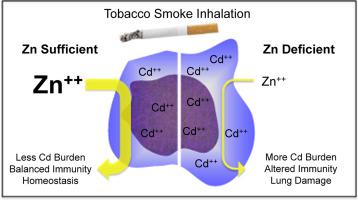Seminars in Cell & Developmental Biology ( IF 6.2 ) Pub Date : 2020-11-03 , DOI: 10.1016/j.semcdb.2020.10.007 Daren L Knoell 1 , Todd A Wyatt 2

|
Cadmium (Cd) is a transition metal, also referred to as a heavy metal, that is naturally abundant in the earth’s crust. It has no known benefit to humans. It is primarily released into our environment through mining and smelting in industrial processes and enters the food chain through uptake by plants from contaminated soil and water. In humans, Cd primarily enters the body through ingestion of foods and cigarette smoke and has an extremely long resident half-life in the body compared to other transition metals. Environmental workplace exposure is also a source through inhalation, although much less common. The principal organs adversely affected by Cd following acute and chronic exposure are the kidneys, bone, vasculature and lung. Cd adversely impacts cell function through changes in gene expression and signal transduction and is recognized as a carcinogen. Despite a substantial body of mechanistic studies in cells and animal models, the overall impact of Cd on innate immune function in humans remains poorly understood. The best evidence is perhaps alteration of reactive oxygen species balance and signaling in cells that regulate innate immunity causing alteration of the inflammatory response that is postulated to contribute to chronic diseases. Epidemiologic studies support this possibility since increased tissue levels in humans are strongly associated with leading chronic diseases including chronic obstructive pulmonary disease (COPD), which will be discussed in depth. Additional studies are required to understand how chronic exposure and accumulation of this leading environmental toxicant in vital organs negatively impact innate immune function and host defense leading to chronic disease in humans.
中文翻译:

镉对免疫功能和肺宿主防御的不利影响
镉 (Cd) 是一种过渡金属,也称为重金属,在地壳中天然含量丰富。它对人类没有已知的好处。它主要通过工业过程中的采矿和冶炼释放到我们的环境中,并通过植物从受污染的土壤和水中吸收进入食物链。在人类中,镉主要通过摄入食物和香烟烟雾进入体内,与其他过渡金属相比,镉在体内的驻留半衰期极长。工作场所环境暴露也是一种通过吸入的来源,尽管不太常见。急性和慢性暴露后受到镉不利影响的主要器官是肾脏、骨骼、脉管系统和肺。镉通过基因表达和信号转导的变化对细胞功能产生不利影响,被认为是一种致癌物质。尽管在细胞和动物模型中进行了大量的机制研究,但镉对人类先天免疫功能的总体影响仍然知之甚少。最好的证据也许是调节先天免疫的细胞中活性氧平衡和信号传导的改变,导致炎症反应的改变,而炎症反应被认为是导致慢性疾病的原因。流行病学研究支持这种可能性,因为人体组织水平的增加与主要慢性疾病密切相关,包括慢性阻塞性肺病(COPD),我们将对此进行深入讨论。需要进行更多研究来了解这种主要环境毒物在重要器官中的长期暴露和积累如何对先天免疫功能和宿主防御产生负面影响,从而导致人类慢性疾病。











































 京公网安备 11010802027423号
京公网安备 11010802027423号